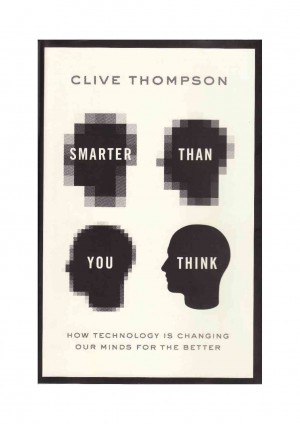When tools affect, dictate how we live

SMARTER THAN YOU THINK: How Technology is Changing Our Minds for the Better by Clive Thompson. New York: The Penguin Press. 2013. 341 pages
You’ve heard it again and again.
Everyday, an older generation bemoans the end of decent writing, book reading and genuine face-to-face conversation with the explosion of social media.
The claim is that traditional ways of learning have now been replaced by mindless surfing without actually verifying if the sources or sites are reliable. There’s also a bad case of narcissism on social media that has engulfed millions, accentuated by endless “selfies” and photos of every party or dinner date.
And yet Clive Thompson, in his easy read “Smarter Than You Think: How Technology is Changing Our Minds for the Better,” says that such fears and even panic over new forms of communication are not entirely new.
Doomsayers once said that books would end vibrant discourse or television would result in the demise of theatre. Even the useful and seemingly harmless telephone was not exempt from bashing.
Thompson clarifies that social media does three phenomenal and useful things: Allow individuals to store vast files of memory, provide more connectedness in social circles and encourage people to publish or communicate more than ever.
One can debate each point and say that not every human encounter needs to be photographed or that every minute rant on Facebook deserves attention. But there’s no doubt about how social media has allowed those on it to reach out more and even learn more.
To prove his points, Thompson fills his work with examples from everyday activities and engagements. Thompson is particularly fascinated with how hobbyists and interest groups have found platforms to share their passions, whether they be fan versions of popular TV shows, music or even political activism.
There’s even a delightful realization about “ambient awareness.”
Since most of one’s friends are also connected on social media, there’s no need to warm up the conversation when you actually meet with queries like “What have you been up to?” That’s because you already know through Twitter or Facebook what they have been occupied with.
Thompson is a New York Times contributor and a columnist for Wired. To a large extent, his buoyant writing style reminds one of Malcolm Gladwell, author of “The Tipping Point” and “Blink,” both lengthy discourses on ordinary daily phenomena.
Thompson’s array of supporting examples are not intended to repeatedly prove his three main points but to simply state the obvious: Social media is here and affecting—even dictating—how we live.
For example, Thompson recalls that the simple slice-of-life moment, when one wants to find out the title of a song or a performer in a movie, has been redefined. Google is a few touches away and, in seconds, the title and performer of the song you were looking for comes up. Google has somehow filled in for that one friend who seemed to know most of these things but isn’t always that accessible.
Thompson also relates how a simple post by his wife about looking for a new home resulted in excellent tips and advice from close friends and even from those who are not always up close and in one’s regular life schedule.
Thompson loosens his grip on the reader towards the end when he rightfully points out that, just as social media generates benefits, despots and powerful governments can perpetuate as much evil with it as well. In many controlled societies, digital communications is allowed to run freely simply because it is a faster way to nab dissidents. Collected memories on hard drives can also become evidence against regime opponents.
Thompson also pitches that “we need to become more adroit at using ambient tools—and remain critical users.”
Nowhere is this echoed more loudly than in the academe where teachers have encouraged, and even begged, students to be more discerning with their Google searches for assignments. Not all top ten sources ranked by Google are created equal, and vigilant reading should be able to filter what is credible and reliable.
So, are we now smarter than we think we are? All Thompson is saying is that we have more tools at our disposal. In fact, we can also decide to manage these tools by disconnecting them from time to time.
Thompson cites anthropologist Genevieve Bell, who believes that “our early infatuation with incessant contact is already easing.”
Bell says many youngsters do switch off their phones for peace or privacy and that many have come to terms that answering every call can be annoying.
How we use these tools will be the barometer to check if we are indeed smarter than we think.